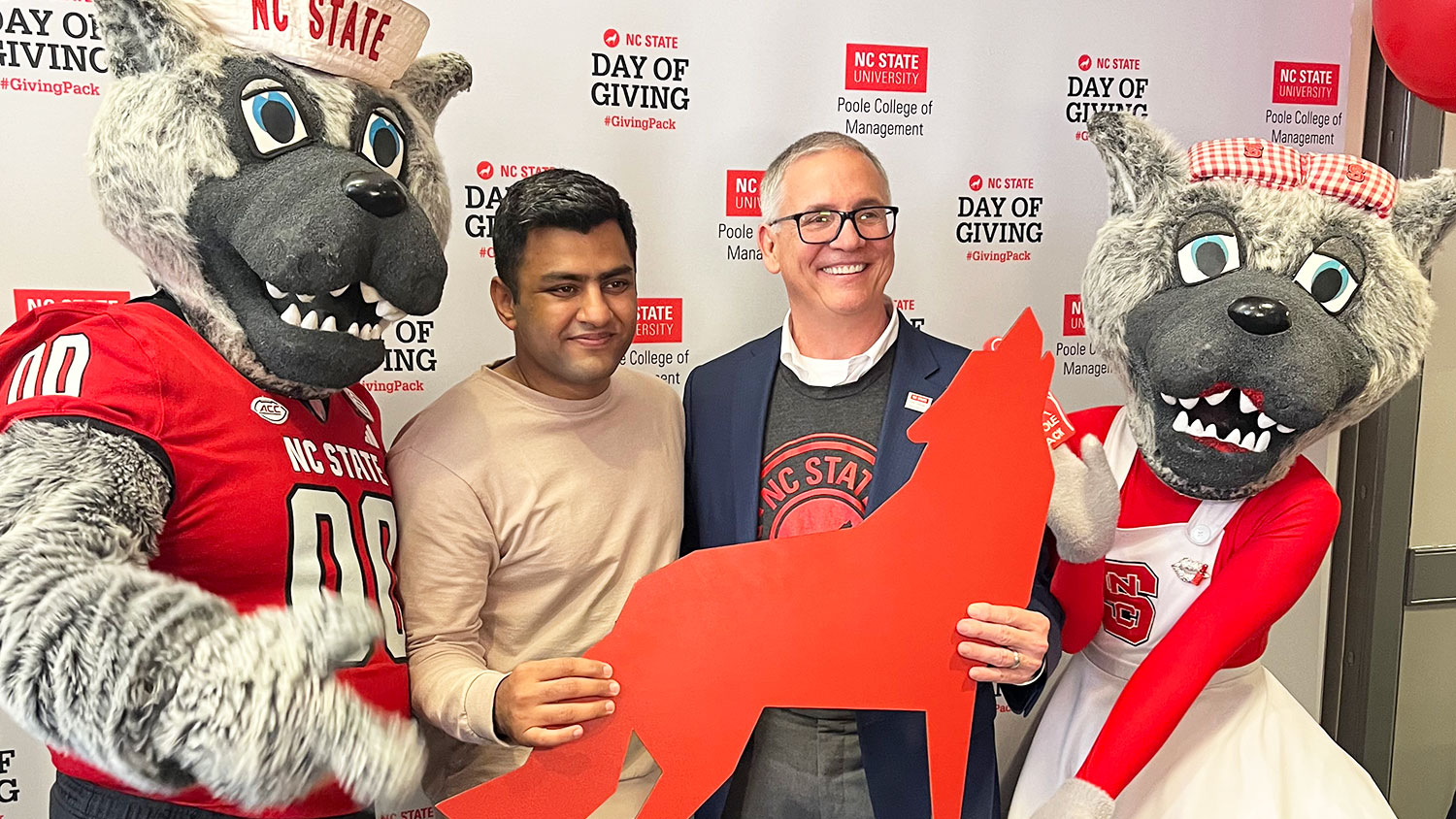Poole College professors bring business expertise to Analytic Science Lab
Five Poole College researchers are among the multidisciplinary teams of researchers who have been working this past year with colleagues at the Laboratory for Analytic Sciences (LAS) housed on NC State’s Centennial Campus and funded by the National Security Agency. The Poole professors are working in the areas of data readiness, cognitive processing, user psychology and collaboration.
Established in August 2013, the LAS is bringing together the brightest minds from government, academia and industry to address the most challenging big data problems through research into advanced analytical methods for complex national security problems. It will be a cornerstone of the emerging advanced data innovation hub at NC State.
“Organizational structure issues are very critical in dealing with the security challenges that the country faces,” said Steve Allen, associate dean for Poole College’s Jenkins graduate programs and research. “It’s one thing to be collecting unimaginable sums of bits and bytes, but making effective decisions from what is collected requires the right data analysis processes, people and safeguards. These are among the management issues addressed by our faculty in their research and teaching,” he said.
“As part of this multidisciplinary collaborative endeavor, they are contributing to solutions for challenges faced by business and government and also furthering their work in the processes and application of big data analytics in research and in preparing our graduates for their careers,” Allen said.
Through a highly competitive selection process, NSA chose NC State for this partnership due in large part to the university’s national leadership and expertise in data analysis along with its strong existing partnerships with industry, universities and government agencies. The geographic proximity of the Research Triangle and NC State’s strong connections to national industry leaders, local businesses and other leading research universities, including Duke University and the University of North Carolina-Chapel Hill, solidified NC State as the ideal host for the LAS.
Now, less than a year later, executive summaries are starting to come in from several of the LAS teams. Following are Poole College’s faculty members, their LAS team assignments and initial summary reports, where available.
TECHNOLOGY: DATA READINESS LEVEL
Robert Hammond, assistant professor of economics
Department of Economics
Robert Handfield, Bank of American Distinguished University Professor of Supply Chain Management
Department of Business Management
This area of research supports the pursuit of a rigorous, metrics-based assessment of the value of data – the Data Readiness Level (DRL) – in various stages of the processing chain, providing a quantitative way to convey the value of a piece of data to answer a specific question.
Hammond brings his expertise in experimental economics and associated laboratory methods. His research will contribute to greater understanding of how users use data in their decision-making processes. Handfield's supply chain management expertise includes understanding the value of data. Data value is an important component driving improved integration of enterprise flows of product information and financial resources. Understanding the value of data within the management of supply chains is expected to provide useful insight into data readiness level. – Data Readiness Level Website
TRADECRAFT: COGNITIVE PROCESSING
Michael Kowolenko, professor of practice
Departments of Accounting and Management, Innovation and Entrepreneurship
This research area supports investigation of the cognitive processes and strategies that one employs when making decisions given limited time and uncertain information. This effort will develop methodologies and design tooling which will improve the efficiency and accuracy of analysis processes. Kowolenko's work in this area will build on the unstructured text analytics projects he has conducted in several corporate environments and the graduate level course on data-driven analytics that he teaches in Poole College’s Jenkins graduate school.
The Cognitive Processing group includes experts who work on problems in political science, communication, management and entrepreneurship, human factors psychology, computer science, and cognitive science. At their core is a common interest in human problem solving, carried out by individuals, groups, or organizations. The group tends tend to focus on complex problems that are challenging simply to understand (sensemaking); problems that involve choosing between complex alternatives (decision making); and problems that require solutions that must be implemented in the real world, with all of its uncertainty.
Their approach is to develop models of intelligence analysis processes at different levels, from different perspectives, looking at the complex interactions between sensemaking, decision making, and policy. In simplistic terms, individuals carry out analyses, collecting observations and building interpretations; analysis results are refined through exchanges with other people, including group work; eventually, recommendations lead to decisions that are supported by the organization. The levels and the interactions between them can be subtle and complex. – Cognitive Processing Website
TRADECRAFT: USER PSYCHOLOGY
Roger Mayer, professor
Department of Management, Innovation and Entrepreneurship
LAS serves three different user groups – researchers, analysts and managers – and seeks to enhance their critical thinking processes. Key in this effort is an understanding of the psychology users bring to their work with both individuals and within groups. As a leading scholar on trust in organizations, Mayer is working with the group to better understand how factors such as interpersonal relationships and organizational structure and culture can impact the quality of an analytic solution.
This area supports two objectives:
- The investigation and improvement of critical thinking skills of individual and groups of users working in both formal and informal situations; and
- An assessment and characterization of the complex interactions between users and the machine analytics employed on their behalf
USER EXPERIENCE: COLLABORATION
Beverly Tyler, professor
Department Management, Innovation and Entrepreneurship
Internal and external collaborations are at the heart of all LAS activities and will manifest themselves in a number of ways. Government researchers will work side-by-side with faculty, students, and industry experts to advance the user’s technology, tradecraft, and user experience. The exchanges resulting from these efforts will spawn new and innovative ideas that will directly enhance the ongoing research activities of LAS.
The funded activities will develop and strengthen relationships with world-class experts external to the government in STEM and non-STEM disciplines. For example, LAS will host conferences, targeted workshops, industry days, and collaboration sessions. In addition, these activities will facilitate, examine, and improve multidisciplinary collaborations among LAS personnel.
With organizational information processing and knowledge and technology management expertise, Tyler will work with the collaboration group to determine how team dynamics, culture, and processes developed might be improved to enhance interdisciplinary integration of knowledge to meet team goals.
This area supports two objectives:
- Develop and strengthen relationships with world-class experts external to the government in STEM and non-STEM disciplines
- Facilitate, study, and improve multidisciplinary collaboration among LAS personnel.


